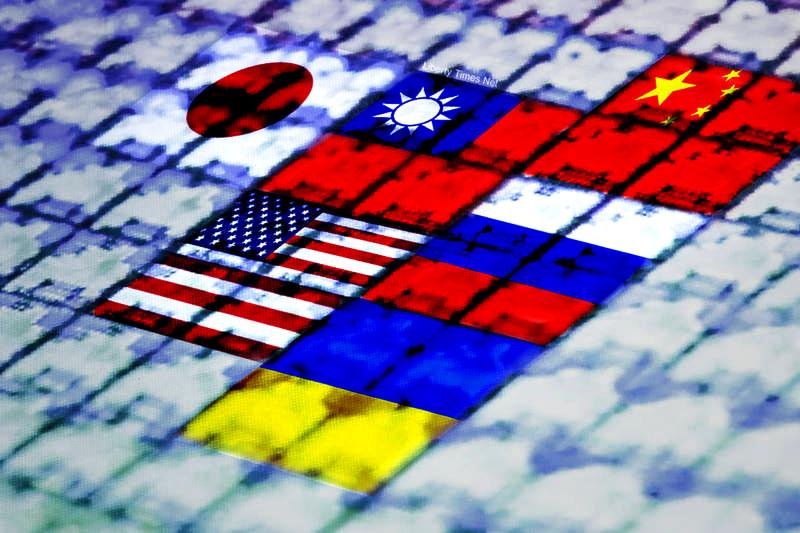Taiwan is not ruling out the possibility of imposing sanctions against Russia over its conflict with Ukraine, the Ministry of Economic Affairs said yesterday, highlighting the nation’s willingness to contribute to efforts to peacefully resolve international conflicts.
Russian President Vladimir Putin on Monday announced that his country would recognize breakaway regions in eastern Ukraine held by Russian-backed separatists, saying that “Russian peacekeepers” would be deployed to the so-called Donetsk People’s Republic and Luhansk People’s Republic.
The US and the EU condemned the move, announcing that those involved would be sanctioned.

Photo: Bloomberg and Taipei Times
The ministry said that if Taiwan imposes sanctions, they would include an export ban on semiconductors and other key components to Russia.
The sanctions would not negatively affect the domestic semiconductor industry, as chip exports to Russia are minimal, totaling only US$21.64 million in 2020, or 0.013 percent of the nation’s exports of US$15.55 billion, it said.
The ministry said it would continue to closely monitor the situation at the Russia-Ukraine border, adding that, as a member of the international community, Taiwan is willing to contribute to efforts to peacefully resolve conflicts.
A Foreign Policy report on Tuesday said that Taiwan — along with Singapore and Japan — supports US calls to implement restrictive export controls on Russia.
The US plan follows a relatively new pattern — dubbed the Foreign Direct Product Rule — which extends US jurisdiction over foreign-made products using US technology, the report said.
“All semiconductors on the planet are made with US software or tools in part, so this will catch any destined to Russia,” the report quoted former US assistant secretary of commerce for export administration Kevin Wolf as saying.
Foreign Policy also quoted other US sources as saying that some US allies in Asia are worried that China might adopt Russia’s playbook for launching an attack on Taiwan.
Top US diplomats, such as US Secretary of State Antony Blinken, are monitoring the Russia-Ukraine situation with regard to possible Western reactions to a Chinese attack on Taiwan, the sources were quoted as saying.

Right-wing political scientist Laura Fernandez on Sunday won Costa Rica’s presidential election by a landslide, after promising to crack down on rising violence linked to the cocaine trade. Fernandez’s nearest rival, economist Alvaro Ramos, conceded defeat as results showed the ruling party far exceeding the threshold of 40 percent needed to avoid a runoff. With 94 percent of polling stations counted, the political heir of outgoing Costa Rican President Rodrigo Chaves had captured 48.3 percent of the vote compared with Ramos’ 33.4 percent, the Supreme Electoral Tribunal said. As soon as the first results were announced, members of Fernandez’s Sovereign People’s Party

MORE RESPONSIBILITY: Draftees would be expected to fight alongside professional soldiers, likely requiring the transformation of some training brigades into combat units The armed forces are to start incorporating new conscripts into combined arms brigades this year to enhance combat readiness, the Executive Yuan’s latest policy report said. The new policy would affect Taiwanese men entering the military for their compulsory service, which was extended to one year under reforms by then-president Tsai Ing-wen (蔡英文) in 2022. The conscripts would be trained to operate machine guns, uncrewed aerial vehicles, anti-tank guided missile launchers and Stinger air defense systems, the report said, adding that the basic training would be lengthened to eight weeks. After basic training, conscripts would be sorted into infantry battalions that would take

GROWING AMBITIONS: The scale and tempo of the operations show that the Strait has become the core theater for China to expand its security interests, the report said Chinese military aircraft incursions around Taiwan have surged nearly 15-fold over the past five years, according to a report released yesterday by the Democratic Progressive Party’s (DPP) Department of China Affairs. Sorties in the Taiwan Strait were previously irregular, totaling 380 in 2020, but have since evolved into routine operations, the report showed. “This demonstrates that the Taiwan Strait has become both the starting point and testing ground for Beijing’s expansionist ambitions,” it said. Driven by military expansionism, China is systematically pursuing actions aimed at altering the regional “status quo,” the department said, adding that Taiwan represents the most critical link in China’s

EMERGING FIELDS: The Chinese president said that the two countries would explore cooperation in green technology, the digital economy and artificial intelligence Chinese President Xi Jinping (習近平) yesterday called for an “equal and orderly multipolar world” in the face of “unilateral bullying,” in an apparent jab at the US. Xi was speaking during talks in Beijing with Uruguayan President Yamandu Orsi, the first South American leader to visit China since US special forces captured then-Venezuelan president Nicolas Maduro last month — an operation that Beijing condemned as a violation of sovereignty. Orsi follows a slew of leaders to have visited China seeking to boost ties with the world’s second-largest economy to hedge against US President Donald Trump’s increasingly unpredictable administration. “The international situation is fraught